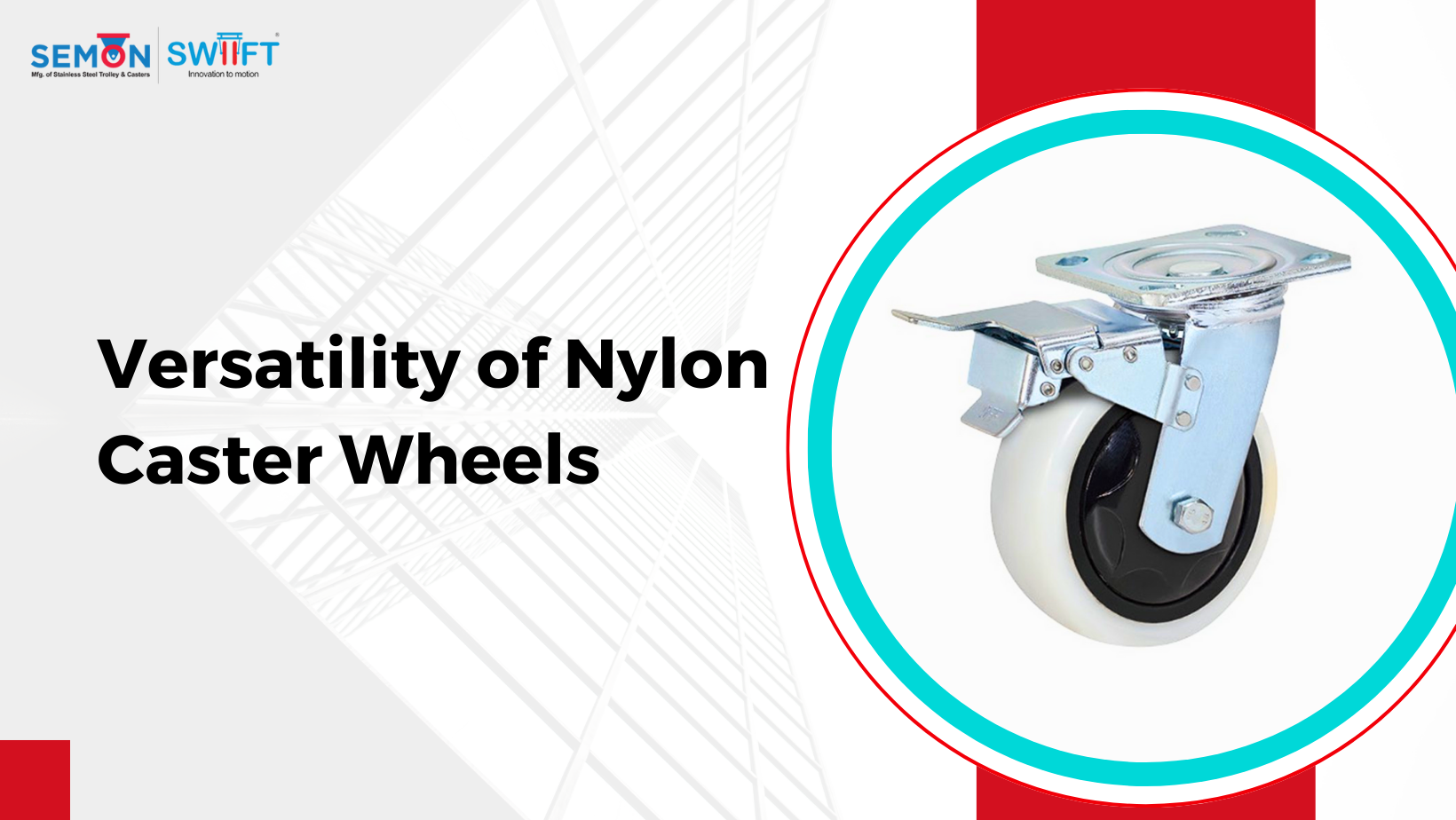Table of Contents
The excellent versatility of nylon wheels has revolutionised a number of industries, making them a crucial breakthrough in modern engineering. Nylon wheels are fundamentally made of a synthetic polymer that is renowned for their remarkable strength and longevity. This substance, which is mostly utilised in nylon caster wheels, provides a special combination of durability and flexibility, which makes it the perfect option for demanding industrial applications. Early in the 20th century, nylon wheels were invented, which was a major development in the field of material science. The evolution of nylon wheels has been directly linked to advances in polymer technology, resulting in their widespread use in heavy-duty equipment such as trolleys. Swiift Engineering, a business that has been at the forefront of integrating these adaptable wheels, is a noteworthy contributor to this industry.The Versatility of Nylon Wheels stands as a testament to their adaptability and efficiency, making them an indispensable component in various sectors.
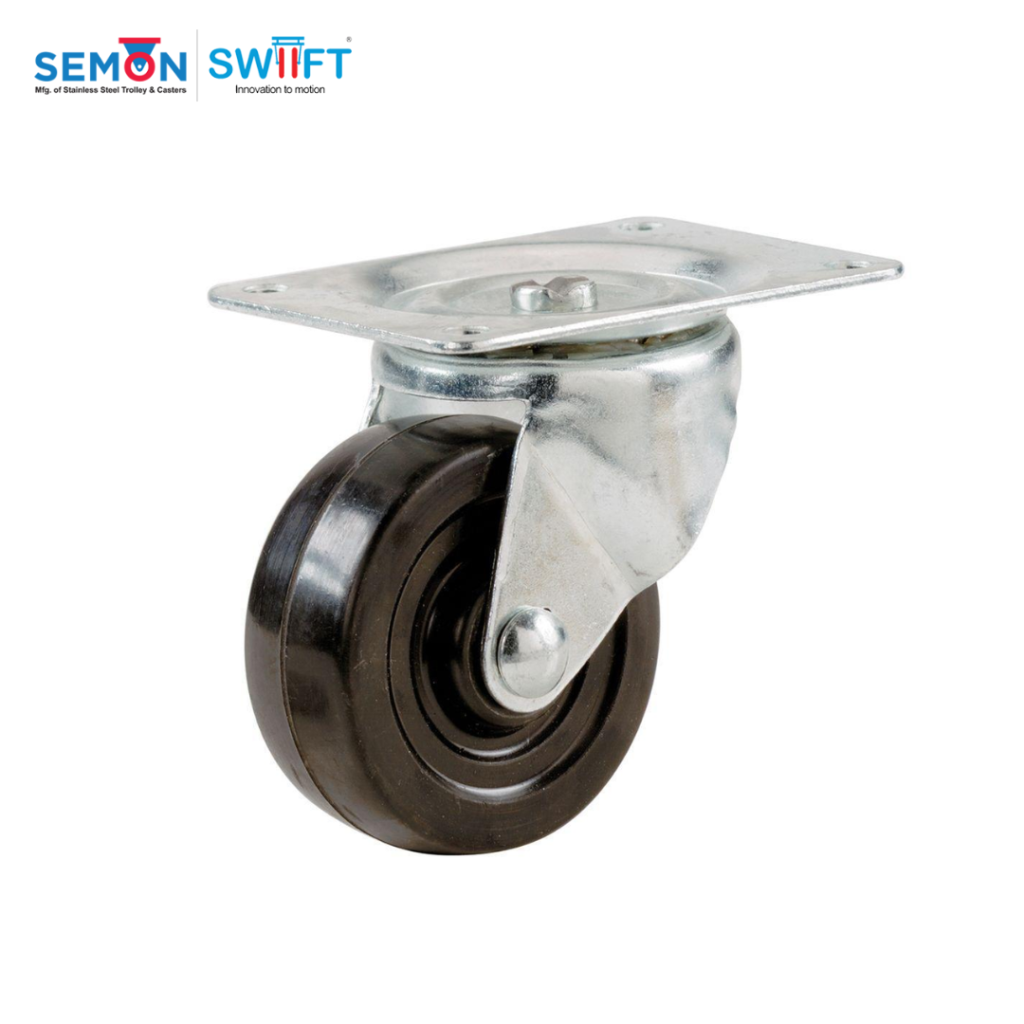
Benefits of Nylon Wheels: Durability, Cost-Effectiveness, Versatility
Durability: One of the most prominent advantages of nylon wheels is their exceptional durability. These wheels are designed to withstand heavy loads and continuous use, making them a long-lasting solution in industrial environments. Unlike traditional materials, nylon resists wear and tear, ensuring that the wheels can maintain their integrity over time, even under strenuous conditions.
Cost-Effectiveness: When it comes to economic viability, nylon wheels offer significant cost benefits. Their longevity means fewer replacements and lower maintenance costs over time. Additionally, the manufacturing process of nylon is relatively cost-efficient, allowing businesses to acquire high-quality nylon caster wheels at a more affordable price compared to other materials.
Versatility: The Versatility of Nylon Wheels is perhaps their most defining feature. These wheels are incredibly adaptable, suitable for a wide range of applications. From industrial nylon wheels for trolleys to nylon caster wheels used in commercial settings, their ability to perform effectively across different environments and surfaces makes them a versatile choice for various needs.
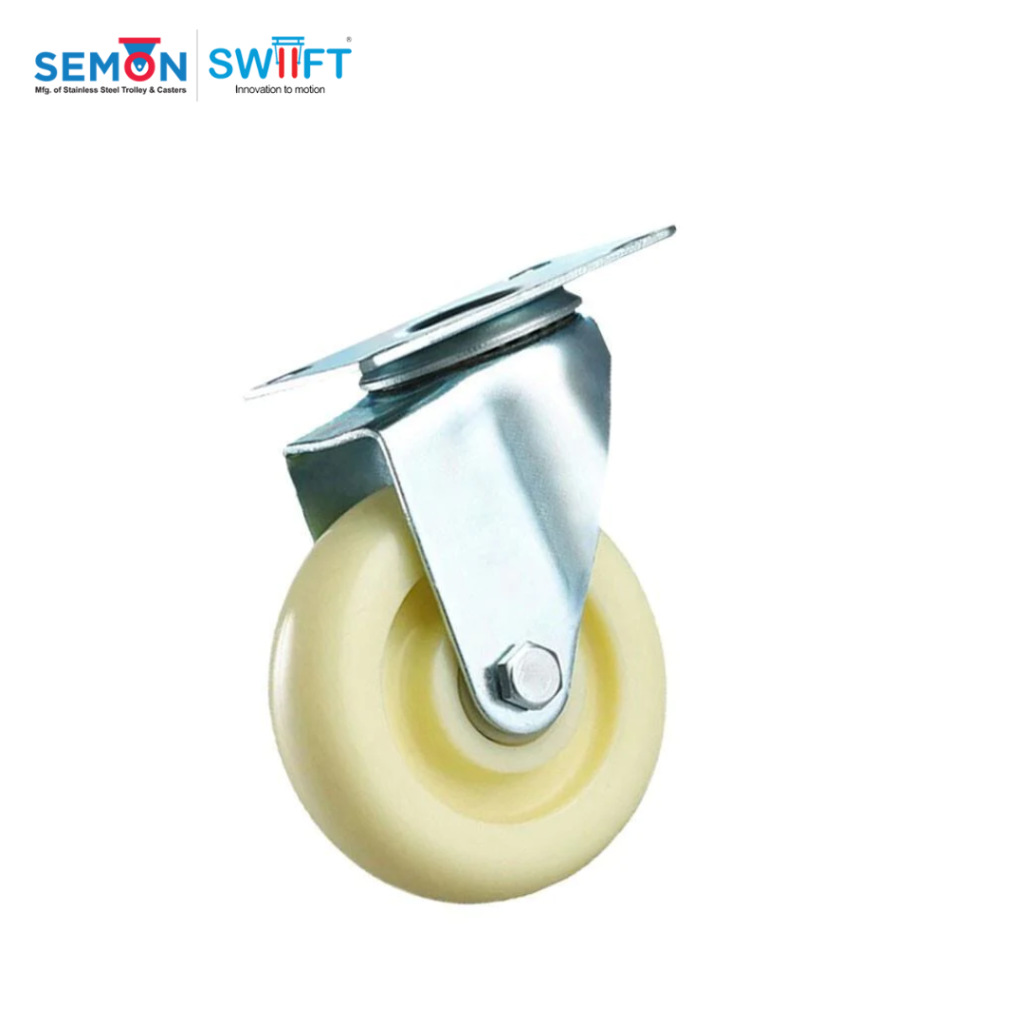
Industrial Applications of Nylon Wheels: Diverse Sector Utilization
Manufacturing Sector: Nylon wheels are essential for handling materials in the manufacturing sector. Because of their resistance to frequent movement and heavy loads, they are utilised in mobile workstations, trolleys, and conveyor systems. The adaptability of nylon wheels is especially useful in settings where durability and smooth performance are essential.
Automotive Industry: Nylon caster wheels are widely used in the assembly and manufacturing processes of the automotive industry. These wheels, which combine strength and flexibility to ensure accuracy and efficiency in the automotive manufacturing process, are used to move vehicles and parts along production lines.
Aerospace Industry: In the aerospace industry, nylon wheels are employed for their lightweight yet sturdy nature. They are often found on ground support equipment, facilitating the safe and efficient movement of parts and machinery. The durability of nylon wheels ensures they can withstand the unique demands of aerospace environments.
Food Processing Industry: Nylon wheels for trolleys are particularly popular in the food processing industry. Their non-porous nature makes them resistant to chemicals and easy to clean, ensuring compliance with hygiene standards. Additionally, nylon does not corrode, making it ideal for wet or corrosive environments.
Healthcare Sector: In healthcare, the application of nylon wheels is seen in medical equipment, such as hospital beds, trolleys, and mobile medical apparatus. Their smooth operation and noise reduction capabilities are vital in ensuring patient comfort and the seamless operation of healthcare facilities.
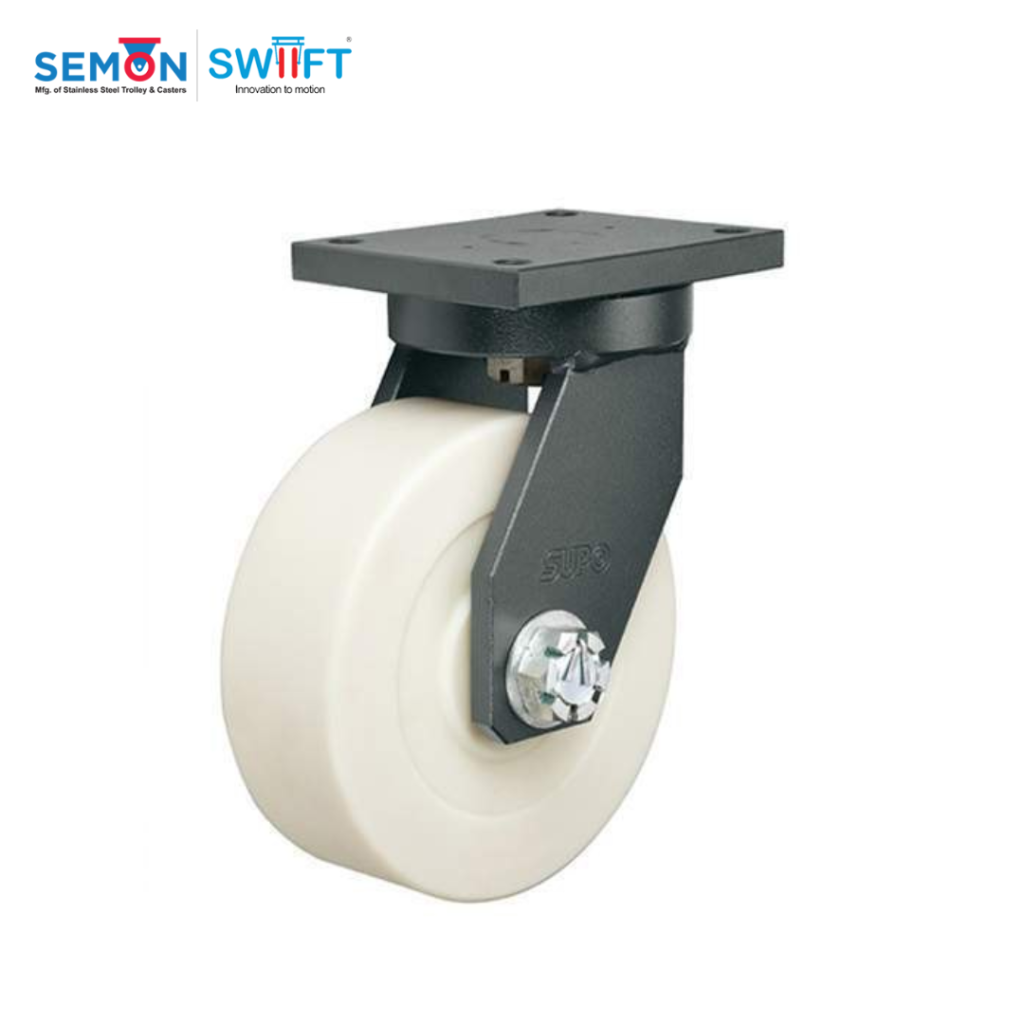
Innovations in Nylon Wheel Technology: Paving the Way for Future Advancements
Recent Developments: The field of nylon wheel technology has witnessed significant advancements in recent years. A key innovation has been the integration of reinforced materials, such as fiberglass or carbon fiber, with traditional nylon compounds. This enhancement has led to the creation of nylon wheels that are even more durable and robust, capable of handling greater loads and resisting wear under extreme conditions. Additionally, advancements in manufacturing techniques have allowed for more precise and consistent wheel production, ensuring higher quality and performance.
Future Trends: Looking towards the future, the versatility of nylon wheels is set to increase further with the incorporation of smart technology. One exciting trend is the development of sensor-embedded nylon wheels for trolleys and other equipment, enabling real-time monitoring of wheel condition, load distribution, and environmental interactions. This could lead to predictive maintenance capabilities, significantly reducing downtime and improving safety. Furthermore, there’s ongoing research into environmentally friendly alternatives for nylon production, which aims to reduce the carbon footprint of nylon caster wheels while maintaining their high performance.
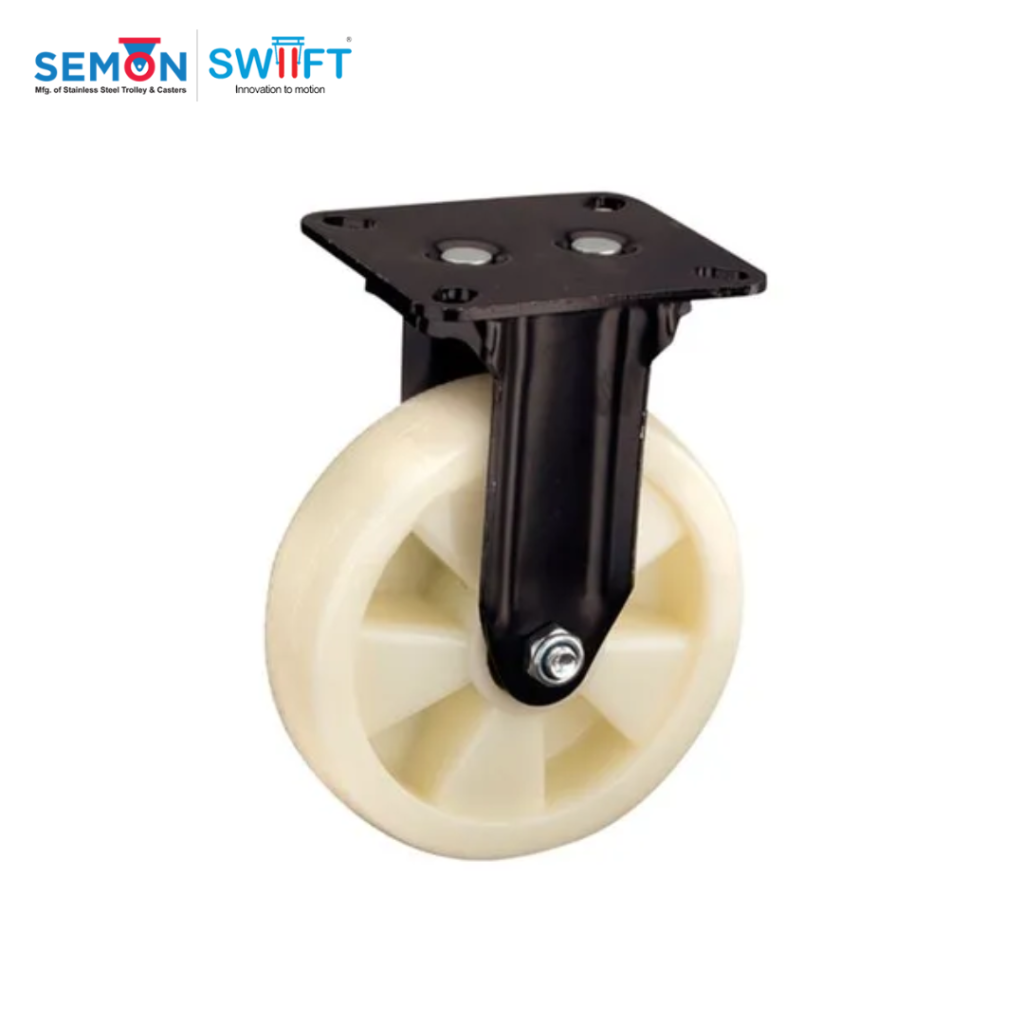
Maintenance and Care of Nylon Wheels: Ensuring Longevity and Efficiency
Best Practices:
Regular Cleaning: To maintain the optimal performance of nylon wheels, regular cleaning is essential. This involves removing any debris or dirt that may have accumulated, which could hinder movement or cause wear. For nylon caster wheels used in environments like food processing or healthcare, stringent cleaning protocols are crucial to prevent contamination.
Lubrication: Proper lubrication of the wheel’s bearings ensures smooth operation and extends the wheel’s life. It’s important to use a lubricant that is compatible with nylon to avoid any chemical degradation of the wheels.
Inspection Routine: Regular inspection of nylon wheels for trolleys and other equipment is key. Checking for cracks, wear, and tear, or any deformation in the wheel structure can prevent potential failures and ensure safety.
Load Management: Adhering to the recommended load capacity is vital. Overloading can cause premature wear and potential failure, undermining the versatility of nylon wheels.
Common Issues:
Wear and Tear: Although nylon wheels are known for their durability, they are not immune to wear and tear, especially under excessive loads or in harsh environmental conditions.
Misalignment: Continuous use can lead to misalignment issues, especially in caster wheels, impacting their movement and efficiency.
Environmental Impact: Exposure to extreme temperatures or corrosive substances can compromise the integrity of nylon wheels. It’s important to consider the specific environmental conditions when selecting and maintaining these wheels.
Conclusion
In summary, the Versatility of Nylon Wheels stands as a testament to the innovative strides made by companies like Swiift Engg Industry. These wheels, including nylon wheel and nylon caster wheels, have revolutionized various industrial sectors, offering unparalleled durability and efficiency. Particularly noteworthy is their application in trolleys, where nylon wheels for trolley have become a game-changer in terms of maneuverability and load management. This exploration not only highlights the adaptability of nylon wheels across different industries but also underscores their role in enhancing operational efficacy and cost-effectiveness. As we look ahead, the potential for further advancements in this field remains vast, promising even greater contributions to industrial progress.
FAQs
What are the main advantages of using nylon wheels over other materials?
Nylon wheels offer a unique combination of durability, cost-effectiveness, and versatility. They are resistant to wear and tear, can handle heavy loads, and are suitable for a wide range of applications across various industries.
Can nylon wheels be used in outdoor environments?
Yes, nylon wheels can be used outdoors. However, it’s important to consider factors such as exposure to extreme temperatures and UV rays, as these can affect the wheel’s longevity and performance. Choosing UV-resistant nylon can help mitigate these issues.
How often should nylon wheels be replaced?
The lifespan of nylon wheels depends on their usage and maintenance. Regular cleaning, proper load management, and routine inspections can extend their life. Replacements are typically necessary when noticeable wear and tear, such as cracks or deformations, occur.
Are nylon wheels suitable for food processing and healthcare environments?
Absolutely. Nylon wheels are an excellent choice for these environments due to their non-porous nature, which makes them resistant to chemicals and easy to clean, thereby meeting hygiene and contamination prevention standards.
Can the load capacity of nylon wheels be customized for specific industrial needs?
Yes, the load capacity of nylon wheels can be customized. Manufacturers can alter the composition and design of the wheels to cater to specific load requirements, ensuring that they meet the unique demands of different industrial applications.
